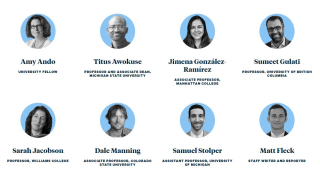Important new discussion paper from a star-studded cast of environmental and resource economists*…
…on the need for the environmental economics discipline to take better care in considering the systemic issues of race and justice in our research published by Resources for the Future:
Our paper argues that systemic racism is such a fundamental force in our world that, if we’re not careful, it will embed itself in the work we do, including well-intentioned efforts to improve environmental quality through research and policy. We define systemic racism as racial discrimination that extends beyond individual beliefs and interactions to pervade institutions, policies, and unwritten norms—in this case, racial discrimination that’s woven into the tools and conventions of environmental and natural resource economics. Even if we don’t think our work is “about” race and racism, systemic racism may be built into that work.
And particularly relevant for my (and John’s) pursuit of better measures of willingness to pay and willingness to accept:
Willingness to pay and willingness to accept are two different ways of inferring how much a person values or cares about something…
But these measures embed systemic racism, regardless of the race of the people we’re studying. If people of color are blocked from living in a neighborhood that has plenty of green space because of discrimination, or if people of color know they’ll be made to feel unwelcome there, they will seem to have a low willingness to pay for a house in that neighborhood, and therefore they’ll seem to have low willingness to pay for green space. Another example we give in the paper is that racism can push some people to seek out recreational fishing locations where they’ll be less likely to encounter other races—a behavior that will distort these inferred values, as well.
Notably, a person’s willingness to pay for something is necessarily limited by their ability to pay—and systemic discrimination has limited the income and wealth of people of color, especially Black people. As a result, these groups of people may appear to value environmental and health-related amenities less. This phenomenon also can interfere with the measurement of people’s willingness to accept; for example, people who are constrained in their means and options may be forced to accept worse outcomes, though to a lesser extent.
I’m going to spend the rest of the day staring questioningly in a mirror.
*We are thrilled (some a little too thrilled) that Amy Ando is replacing me as Chair of the Department of Agricultural, Environmental, and Development Economics at Ohio State in July.

